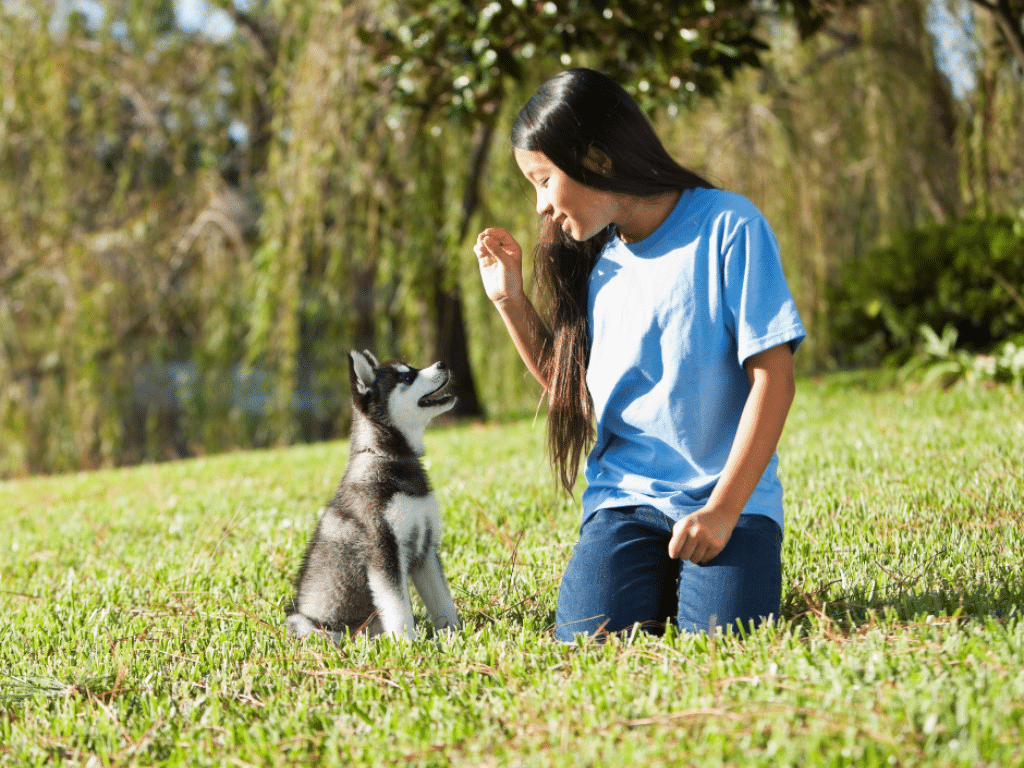Dog training can be a fulfilling and rewarding experience for both you and your furry companion. However, it can also come with its challenges, one of which is dealing with superstitious behaviours. If you’re a dog owner in Hamilton, this article will provide you with valuable insights into understanding and managing these behaviours to ensure effective dog training.
What are Superstitious Behaviours in Dog Training?
 Superstitious behaviours in dog training are actions or responses that a dog mistakenly associates with a particular outcome or reward. These behaviours arise when a dog incorrectly links an irrelevant action with receiving a treat, praise, or another form of positive reinforcement. For example, if your dog receives a treat after scratching the ground, it might believe that scratching the ground is what earns the treat, even if the treat was intended to reward a different behaviour.
Superstitious behaviours in dog training are actions or responses that a dog mistakenly associates with a particular outcome or reward. These behaviours arise when a dog incorrectly links an irrelevant action with receiving a treat, praise, or another form of positive reinforcement. For example, if your dog receives a treat after scratching the ground, it might believe that scratching the ground is what earns the treat, even if the treat was intended to reward a different behaviour.
How Do Superstitious Behaviours Develop?
 Superstitious behaviours often develop unintentionally during the training process. Here are a few common ways this can happen:
Superstitious behaviours often develop unintentionally during the training process. Here are a few common ways this can happen:
- Inconsistent Reinforcement: If you reward your dog at inconsistent times or for inconsistent actions, your dog might start associating random behaviours with the reward.
- Timing Issues: If there’s a delay between your dog’s action and your reward, your dog might perform additional actions that it mistakenly believes are linked to receiving the treat.
- Accidental Reinforcement: Sometimes, you might inadvertently reward a behaviour without realizing it, such as petting your dog when it’s barking, which can lead to your dog associating barking with receiving attention.
Examples of Superstitious Behaviours
 Here are some common examples of superstitious behaviours that dogs might exhibit:
Here are some common examples of superstitious behaviours that dogs might exhibit:
- Pawing at the Ground: A dog might believe that scratching or pawing at the ground is necessary to receive a treat.
- Spinning or Circling: Some dogs might start spinning or circling before receiving a treat, thinking that this action is required.
- Jumping or Barking: Dogs might start jumping up or barking in anticipation of a reward, mistakenly believing these actions are linked to receiving treats.
Identifying Superstitious Behaviours

- Repetitive Actions: If your dog consistently performs the same irrelevant action before or after receiving a reward, it might be exhibiting a superstitious behaviour.
- Confusion or Frustration: If your dog seems confused or frustrated during training sessions, it might be because it’s trying to perform unnecessary actions to get a reward.
- Lack of Progress: If your dog isn’t making progress in training despite consistent efforts, superstitious behaviours might be hindering its learning.
Preventing Superstitious Behaviours
Preventing superstitious behaviours requires careful and consistent training techniques. Here are some strategies to help you avoid these issues:
- Clear and Consistent Cues: Ensure that your cues are clear and consistent. This helps your dog understand exactly what behaviour is being rewarded.
- Immediate Reinforcement: Reward your dog immediately after the desired behaviour to prevent it from associating the reward with any other actions.
- Avoid Accidental Reinforcement: Be mindful of your actions and avoid accidentally reinforcing unwanted behaviours. For example, avoid giving attention to your dog when it barks or jumps for no reason.
Correcting Superstitious Behaviours
If your dog has already developed superstitious behaviours, don’t worry – they can be corrected with patience and consistency. Here are some steps to help you correct these behaviours:
- Identify the Behaviour: Clearly identify the superstitious behaviour and the context in which it occurs.
- Re-train with Consistency: Use consistent cues and rewards to retrain your dog, focusing on the desired behaviour and avoiding reinforcement of the superstitious action.
- Gradual Change: Gradually phase out the superstitious behaviour by only rewarding the desired action and ignoring the irrelevant behaviour.
- Professional Help: If you’re struggling to correct superstitious behaviours, consider seeking help from a professional dog trainer in Hamilton like K9 Principles who can provide expert guidance and support.
Why Do Superstitious Behaviours Matter in Dog Training?
Understanding and addressing superstitious behaviours is vital for several reasons:
- Effective Training: Superstitious behaviours can hinder the effectiveness of your training sessions, causing confusion and frustration for both you and your dog.
- Building Trust: Consistent and clear training helps build trust between you and your dog, making the learning process more enjoyable and successful.
- Behavioral Development: Correcting these behaviours ensures your dog develops the right habits and behaviours, contributing to its overall well-being and happiness.
Benefits of Professional Dog Training in Hamilton
Enrolling your dog in a professional training program can be highly beneficial, especially if you’re dealing with superstitious behaviours. Here are some advantages of professional dog training in Hamilton:
- Expertise: Our professional trainers have the knowledge and experience to identify and correct superstitious behaviours effectively.
- Structured Training: Our training programs provide a structured approach, ensuring that your dog learns in a consistent and systematic manner.
- Socialization: Our group training classes offer opportunities for your dog to socialize with other dogs, which can help reduce anxiety and improve overall behaviour.
- Personalized Guidance: Our professional trainers can provide personalized advice and strategies tailored to your dog’s specific needs and behaviours.
Conclusion
Understanding and managing superstitious behaviours in dog training is essential for achieving effective results. By being aware of how these behaviours develop, identifying them early, and using consistent training techniques, you can prevent and correct superstitious behaviours in your dog. If you need additional support, consider enrolling your dog in our professional dog training programs in Hamilton either through our group classes or our in-home private dog training. With the right approach and guidance, you can ensure that your dog learns desired behaviours and enjoys a happy, well-trained life.
- Name: K9 Principles
- Address: Haldimand County, Greater Hamilton Area, Burlington and Most of Norfolk County
- Phone: 289 880-3382
- Email: k9principlesinc@gmail.com
- Website: www.k9principles.ca
FAQs
-
Superstitious behaviours are actions that a dog mistakenly associates with receiving a reward, leading it to perform irrelevant actions during training.





